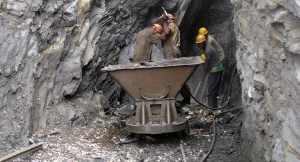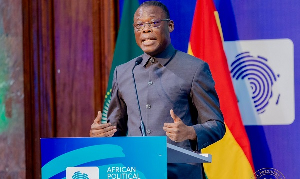The Ghana Association of Small-Scale Miners (GASSM), has called on the government to prioritize investment in the sector to help sustain Ghana's economic gains and shore up revenue in the wake of the COVID-19 outbreak.
According to the Association, growth in many sectors had slide lately amidst the COVID-19 global devastation, yet the return on investments in the mining sector remained exceptionally high and profitable, hence, the urgent need for government to map out cogent strategic investment interventions to rake in more revenue for development.
"Government stands to make an astronomical increase in revenue if it takes immediate pragmatic steps to invest in Small-Scale mining to expand their capacities and create more employment opportunities for all."
"The prices of Ghana's major revenue magnets - fuel, cocoa, coffee, timber among others have fallen drastically at the international market, yet, the prices of minerals keep surging, signalling the urgent need for government investment in the sector to rake in the needed revenue for investments," it said.
Mr Francis Opoku, the Public Relations Officer of the Association made the call in an interview with the media in Assin Fosu on the impact of the COVID-19 pandemic on the Small-Scale industry in Ghana.
Beyond direct fiscal receipts, he explained that the sector when fully integrated into the economy through the provision of inputs for other sectors, research and development activities, and technology transfers, could have greater capacity.
This will contribute to the state of development of major sectors like banking, financial services, transport, logistics, amongst others.
Mining also contributes to development through the implementation of Corporate Social Responsibility (CSR) programmes for host Communities and the general public at large and reiterated that in 2011, US$24million was spent on CSR projects by the mining companies.
According to Mr Opoku, the wave of investments in the sector by mining companies in recent years had boosted production and improved cost efficiency in mining yet, that was not enough to sustain the sector.
"Investment in the sector is huge, which required strategic investment and partnership aided by the right business regulatory regimes to flourish the sector," he said.
Nonetheless, Mr Opoku praised the government for its firm commitment to improving the industry regulation, tackling long-term issues of illegal activity, known as "galamsey", correct environmental damage and strengthening capacity.
He was also grateful to the government for lifting the ban on small-scale mining operations after nearly two years.
The ban, according to him, was originally imposed due to the proliferation of illegal mining activity over the past decade, which was causing serious environmental damage, raising tensions with local communities, posing serious health and safety threats, as well as the loss of revenue by the nation.
Mr Opoku observed that while the ban was somewhat controversial in the long term, many in the industry saw it as an opportunity to reboot and legitimise the small-scale mining segment after an extensive process of vetting and re-vetting miners and concessions before licenses were issued under a new framework for small-scale mining.
Outlining other measures to sustain the sector, the Public Relations Officer of the Association stressed the need for credit facilities to be made accessible to the members to sustain their trade and livelihood.
He called on the government to systematically design areas to be licensed to small-scale miners and provide documents showing areas and maps to facilitate accessibility.
He was not happy about the fact that regularisation within the sector was low and attributed that to lack of resources and stressed the need for government to de-freeze ban on importation of excavators among others.
Also, institutions and regulatory agencies must endeavour to commit to their work and be adequately resourced to promote sanity in the sector and minimise environmental degradation, corruption, and nepotism.
In all of these, he assured that with the right policies, backed by judicious use of resources and with support from Development Partners, the mining sector could catalyze sustainable development within a framework of stakeholder collaboration.
Business News of Wednesday, 27 May 2020
Source: GNA













